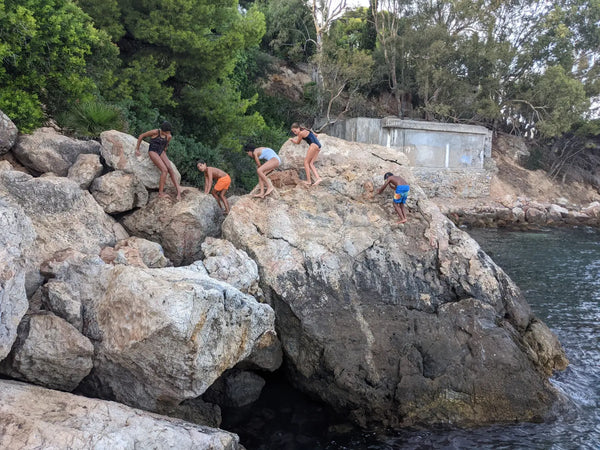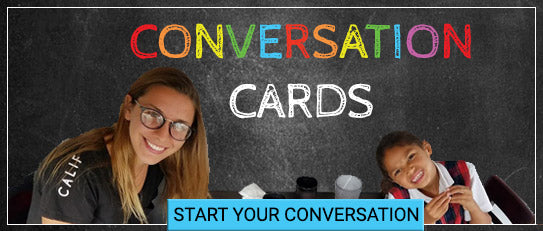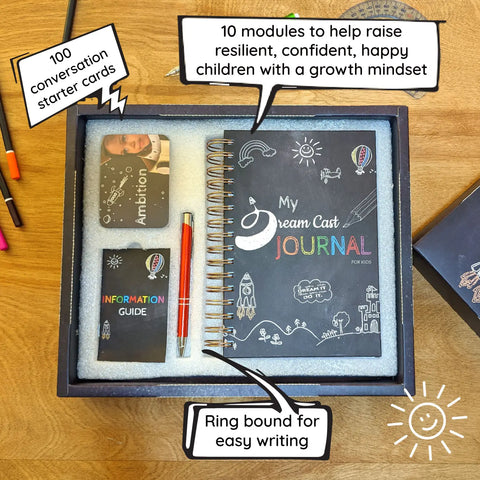How to build self esteem and confidence in your kids.
Our family was having dinner on the backyard terrace and chatting about how hard it is to learn Spanish. We let them know know how proud we were of them for attending a all Spanish speaking school, while Michele was looking up how to say "We love eating outside" in Spanish ("Nos encanta comer afuera")
We realized that it was a perfect opportunity to have a conversation with the kids about how to build self esteem and confidence and pulled up one of the how to build self confidence prompt cards on Michele's mobile.
Our kids have heard all the questions before as they were our test subjects for almost a year. Nonetheless, we asked them the first question that come up "What are you most proud of recently"

What is self confidence
Our daughter Amber (10 yrs old) jumped in super excited rambling about how she is proud of making two new friends since moving to Spain about a month ago and that she is really good at making friends. This was Meka's, our son who is 7 yrs old, an opportunity to pipe up that he made two new friends just last week, in a competitive tone.
As the conversation continued we slipped in questions like, "why do you think that is", "what make you so good at...", "do you think...?".
The conversation also took a weight off our minds as parents, knowing that our kid's "got this!", - they are not suffering from a lack of self confidence and that our move to our 5th country has not messed up our kids and their confidence, in fact it may have just done the opposite, however, time will tell but I'm pretty confident that they are going to be more than awesome.
The below 12 ways to help your children grow in confidence have helped us and our kids a lot when thinking about and building confidence.
We will try and share as much of our parenting journey over the next few precious years with you and hope that you will find it helpful and entertaining.
We also have the conversational prompt cards that we create with our kids available to have emailed or sms to you for free (click here for a copy)
Here are 12 ways to help your child(ren) grow in confidence.
- Model confidence yourself. When your kids see you tackle new tasks with optimism and lots of preparation sets a good example for kids. That doesn’t mean you have to pretend to be perfect. Do acknowledge your anxiety, but don’t focus on it—focus on the positive things you are doing to get ready.
- Don’t get upset about mistakes. Help your kids see that everyone makes mistakes, even you and the important thing is to learn from them.
- Encourage them to try new things. Instead of focusing all their energy on what they already excel at. Attaining new skills makes kids feel capable and confident that they can tackle whatever comes their way.
-
Allow kids to fail. It’s natural to want to protect your child from failure, but trial and error is how kids learn, and falling short on a goal helps kids find out that it’s not fatal. It can also spur kids to greater effort, which will serve them well as adults.
- Praise perseverance. Learning not to give up at the first frustration or bail after one setback is an important life skill. Confidence and self-esteem are not about succeeding at everything all the time, they’re about being resilient enough to keep trying, and not being distressed if you’re not the best.
- Help kids find their passion. Exploring their own interests can help kids develop a sense of identity, which is essential to building confidence. Of course, seeing their talents grow will also give a huge boost to their self-esteem.
- Set goals. Articulating goals, large and small, and achieving them makes kids feel strong. Help your child turn desires and dreams into actionable goals by encouraging her to make a list of things they would like to accomplish. Then, practice breaking down longer-term goals into realistic benchmarks. You’ll be validating your child's interests and helping them learn the skills they’ll need to attain her goals throughout life.
- Celebrate effort. Praising kids for their accomplishments is great, but it’s also important to let them know you’re proud of their efforts regardless of the outcome. It takes hard work to develop new skills, and results aren’t always immediate. Let kids know you value the work they’re doing.
- Expect them to pitch in. They might complain, but kids feel more connected and valued when they’re counted on to do age-appropriate jobs, from picking up toys to doing dishes to picking up younger siblings from a play date.
- Embrace imperfection. As grown-ups we know perfection is unrealistic, and it’s important for kids to get that message as early as possible. Help kids see that whether it’s on TV, in a magazine, or on a friend’s social media feed, the idea that others are always happy, successful, and perfectly dressed is a fantasy, and a destructive one. Instead, remind them that being less than perfect is human and totally okay.
- Set them up for success. Challenges are good for kids, but they should also have opportunities where they can be sure to find success. Help your child get involved with activities that make him feel comfortable and confident enough to tackle a bigger challenge.
- Show your love. Let your child know you love him no matter what. Win or lose the big game, good grades or bad. Even when you’re mad at him. Making sure your child knows that you think he/she’s great — and not just when he does great things — will bolster his self worth and self confidence even when she/he’s not feeling good about themselves.
The Dream Cast Project team
-----------------------
Dream Cast Kids Journal helps teach empathy.
We have included writing prompt to help reinforce the concepts such as empathy and kindness, gratitude and more in both the Dream Cast Journal and Dream Cast Conversation Starter Cards tying the learning experience together perfectly.











